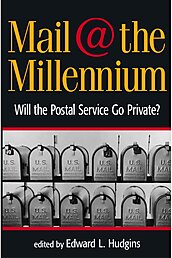“In the past, calls for the privatization of the U.S. Postal Service usually focused on that government monopoly_s inefficiencies and high costs. But now other issues make preserving the status quo even more onerous and the benefits of privatization even greater.
The Postal Service is seeing some of its most profitable business, such as first-class correspondence and bill paying, being taken up by e‑mails, faxes, on-line communications, and private carriers. To make up for projected lost revenue, the USPS is entering electronic commerce and other sectors far removed from delivering the mail. But those activities constitute unfair competition with private-sector providers because the USPS pays no taxes, can borrow from the U.S. Treasury, is exempt from most government regulations, and has regulatory authority that it can use against competitors.
This book analyzes why the Postal Service needs to be privatized if mail delivery is to be an efficient component of rather than a corroded cog in the communications and information economy.
The first section examines the state of the USPS, including its dangerous forays into cyberspace. The second section considers the changing structure of the mail market, including a look at labor problems, fatal flaws with the organization of the USPS, and the probable consequences of competition. The third section explores how to unwind government monopolies and reviews postal reforms in other countries. The fourth section offers actual reform and privatization proposals.
Essays by Postmaster General William Henderson, Federal Express founder Frederick Smith, and Pitney Bowes CEO Michael Critelli contribute to making this volume an indispensable guide for charting the future of mail in the new millennium.”
